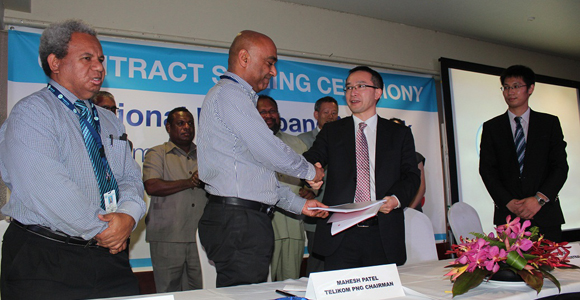Telikom PNG is upgrading and expanding its network. Chairman Mahesh Patel talks to Business Advantage PNG about its K600 million (US$200 million) deal with Chinese technology provider Huawei and its commitment to improving customer service.

Signing the deal with Huawei. Credit: Telikom PNG
With its revenues from fixed line phone calls falling, Telikom will concentrate on developing its growing fixed-line broadband business and developing 4G mobile internet services, according to the company’s Chairman Mahesh Patel.
The K600 million (US$200 million) deal signed earlier this month with Huawei will enable the state-owned telecommunications provider to embark on a two-year program of investment.

Telikom PNG Chairman, Mahesh Patel
‘The first stage will be to fix our current infrastructure. The second will be concurrently to put on 4G mobility and get high speed data,’ Patel tells Business Advantage PNG.
The deal with Huawei will allow Telikom to offer faster broadband speeds, capable of delivering new services such as e-Health, e-Education, Digital TV and e-Government applications, while also providing a new backbone for fixed and mobile services.
‘Fixed line voice is going to keep declining, with the international trend. I think our growth is going to come from fixed line broadband prospects,’ says Patel.
The new investment is intended to enable Telikom to compete more effectively with its main competitor, Digicel, as Public Enterprise and State Investments Minister Ben Micah told The National last week:
‘Telikom at this stage really needs a complete upgrade of its systems … If we do not upgrade Telikom, this major state asset owned by the people of Papua New Guinea will be run down to the ground by Digicel’.
Commitment to service improvement
Patel says the Huawei deal will also allow Telikom to greatly improve customer service and reliability—two areas where he admits Telikom needs to improve.
‘We’ve been working on really changing the culture of customer service. We’ve set up what we call a service assurance team, which is on the job all the time—we’ve got a call centre open 24/7.
‘I think there has been a positive change of culture.
‘All the new infrastructure will be all IP [internet protocol] based. We’ll be setting up National Operating Centre so we’ll be able to fix issues before the customer knows, and we’ll be able to see where the faults are happening rather than wait for people to call in.
‘With the change of this technology, I think the efficiencies will come.’
Patel also flagged a more aggressive approach to sales and marketing:
‘We’ve got some very switched on Papua New Guinean engineers at the back end of the organisation, but Telikom has never been driven by front-line sales and marketing and the aggression that the private sector has. We’re going out selling aggressively into the front-line, concentrating on fixed line broadband.’
Refinancing
In preparation for its next stage of investment—Telikom has had to tighten its belt. A recently-completed voluntary exit scheme has seen the number of employees fall from 1400 to 900.
While the majority of the money for the Huawei deal will come from a China Eximbank loan brokered by the Independent Public Business Corporation, Telikom will have to fund about K100 million (US$44 million) internally.
‘We have done some restructuring with our debt … with refinancing to bring our interest costs down,’ says Patel.
But Patel points out Telikom is a profitable enterprise, with an annual EBITDA [earnings before interest, taxation, depreciation and amortisation] of ‘between K80 million and K90 million’.
The future of Citifon
Having watched its old B-Mobile subsidiary become a stand-alone business in 2008, Telikom launched a new CDMA-based mobile phone service, Citifon, in early 2011, to compete with rivals Digicel and Bemobile. Patel suggests the days of CDMA, an older mobile technology, may be numbered.
‘It looks like we will not be investing further in [CDMA], because with the new Huawei deal coming on, it basically will give us the opportunity of LTE, or 4G, technology,’ he says. ‘It would be silly to try and build on CDMA when we know we can easily replace it with far superior technology.’
Turning around such an established enterprise was never going to quick job but, with money to spend and a new approach to service delivery, Patel is beginning to see progress.
‘When the new board took over in January this year, I had calls from the banks almost every day about issues and down time. In the last month or six weeks, since we’ve set up this service assurance, there’s been a lot of positive feedback. There will always be a whole bunch of negatives, but it’s nice to see positives coming out from a lot of people.
‘A lot of customers who actually migrated away from Telikom have actually now come back to us because we’ve got a far superior system.’








Speak Your Mind